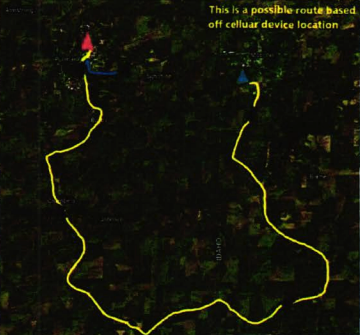
A hit-and-run unfolded outside of Bryan Kohberger’s home on the same night that he allegedly murdered four University of Idaho students, it has been revealed.
At around 11.40pm on the night of 12 November, police were called to a report of a crash in front of an apartment complex on the Washington State University (WSU) campus, in Pullman, Washington state, according to authorities.
The apartment complex, which houses mainly graduate or PhD students, had been home to Mr Kohberger since August when he relocated from his home state of Pennsylvania to start a PhD program in criminal justice at the university.
When officers arrived on the scene, they found two pedestrians – a male WSU student and a woman – with injuries after being struck by a car.
The driver had already fled the scene.
Witness Turner Gardner told Business Insider the incident was “horrifying” and the two victims were taken to hospital for treatment for serious injuries.
Hours later, 19-year-old student Carmen Fernandez was arrested and charged with DUI, felony vehicular assault and hit-and-run, the Pullman Police Department said at the time.
It is not clear if Mr Kohberger witnessed the hit-and-run which took place within the eyeline of his apartment.
However, investigators were reportedly still on the scene of the crash at the housing complex when the 28-year-old allegedly left his home in the early hours of 13 November and travelled to Moscow to carry out the murders.
Cellphone data, detailed in the probable cause affidavit for his arrest, places Mr Kohberger at the apartment complex when the crash took place with his phone pinging on a nearby mast up until 2.42am on 13 November.

Almost exactly three hours on from the hit-and-run at around 2.47am, Mr Kohberger’s cellphone revealed that he had left his home and was traveling south through Pullman, according to the affidavit.
From 2.47am, investigators believe he turned his cellphone off to try to cover his tracks. It was back online from 4.48am as he appeared to make a long-winded journey back to his apartment.
During the time the phone is thought to have been turned off, investigators say Mr Kohberger drove to the student rental home on King Road, Moscow, and broke into the house between 4am and 4.25am.
There, he allegedly stabbed Kaylee Goncalves, Madison Mogen, Xana Kernodle and Ethan Chapin to death in a brutal attack.
The affidavit also reveals that surveillance footage captured Mr Kohberger’s white Hyundai Elantra travelling on the route from the WSU campus where he lived to the home on King Road, Moscow, and back again during the same time period. He arrived back to his campus home at around 5.30am.
Witnesses told Business Insider that police were still on the scene at that time – meaning that Mr Kohberger likely brazenly drove past officers multiple times as he travelled to and from his alleged killing spree.
Officers were rerouting traffic away from the most direct way in and out of the housing complex overnight, the outlet reported.
Hours later at around 9am, the affidavit reveals that cellphone data placed Mr Kohberger back at the home on King Road – suggesting that he returned to the scene of the crime.
Investigators believe that he may also have stalked the student home at least 12 times in the run-up to the night of the murders, according to the affidavit. The exact dates and times of these instances were not revealed in the affidavit but all bar one were in the late evening or early morning hours.
Prominent criminal defence attorney Duncan Levin told The Independent that Mr Kohberger did a poor job of “covering his tracks” and that the prosecution has a “very strong case” against him.

“In short he should get an F in criminology class,” he said. “He did not do a good job of covering his tracks.”
As well as the cellphone data and his white Hyundai Elantra, Mr Kohberger was tied to the murders through DNA evidence and an eyewitness account, according to the bombshell probable cause affidavit.
DNA found on a knife sheath left behind on the bed next to the bodies of Mogen and Goncalves was matched to Mr Kohberger, using DNA obtained from trash taken from his parents’ home and a genetic genealogy database.
One of the victims’ surviving roommates was also able to partially describe the killer to investigators after she came face to face with him in the home. Her description matched that of Mr Kohberger.
Mr Kohberger, who is presumed innocent until proven guilty at trial, is now facing the death penalty for the murders of the four students on 13 November.
Further evidence – and the cases that both the defence and the prosecution plan to lay out – will likely remain under wraps until Mr Kohberger’s next court appearance in the summer.
The preliminary hearing was scheduled for 26 June at the request of Mr Kohberger’s attorneys.
The entire week has been set aside for the hearing – when evidence of the case against Mr Kohberger will be laid out for the first time in court and when he is likely to enter a plea on the charges.
Until then, Mr Kohberger will be held behind bars at Latah County Jail after the judge ordered him to be held without bail.
The motive for the murders is unknown and it remains unclear why Mr Kohberger allegedly targeted the victims, with no known connection between the four students and the suspect. The murder weapon – a fixed-blade knife – is also yet to be found.
At the time of his 30 December arrest, Mr Kohberger had just completed his first semester as a PhD student in criminal justice at Washington State University.
For years, he had shown a keen interest in criminals and the criminal mind, studying criminology at DeSales University in his home state of Pennsylvania – first as an undergraduate and then finishing his graduate studies in June 2022 – before moving to the Washington-Idaho border town of Pullman to begin his PhD program.
While at DeSales, he studied under renowned forensic psychologist and leading expert on the BTK killer Katherine Ramsland and also carried out a research project seeking “to understand how emotions and psychological traits influence decision-making when committing a crime”.







